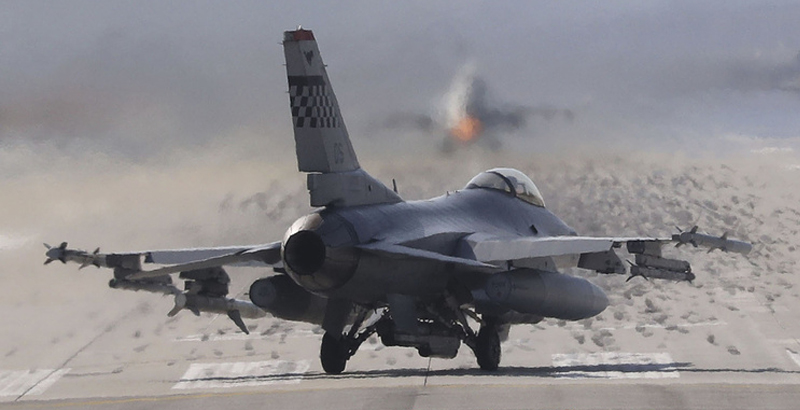The B61-12 bomb without a nuclear warhead has been successfully tested by the US National Nuclear Security Administration and the country’s air force.

The F-16 fighter-bomber (Photo: EPA / Yonhap)
The National Nuclear Security Administration (NNSA) within the US Department of Energy and the US Air Force have conducted a test of a modification of the B61 atomic bomb, representatives of the Kirtland Air Force Base, New Mexico, reported on Thursday.
As the press service of the military base specified, on March 15, the B61-12 bomb without a nuclear warhead was tested. The bomb was dropped from the F-16 fighter-bomber on the Nellis test site, Nevada. The test was conducted in the framework of a program to extend the B61’s operational life by upgrading its nuclear and non-nuclear components in the process of improving its cumulative reliability and reliability of its security systems.
As the command of the military base explained, this was the first test of the B61-12 with usage of the F-16.
“The B61-12 gravity bomb ensures the current capability for the air-delivered leg of the US strategic nuclear triad well into the future for both bombers and dual-capable aircraft supporting NATO,” a representative of the US Air Force’s Nuclear Weapons Center, Paul Waugh, stressed. According to him, the B61-12 are set up so as to dovetail to devices of the B-2A, B-21, F-15E, F-16C/D, F-16 MLU, F-35 and PA-200 aircraft.
The B61 bomb exists in the form of the modifications of B61-3, -4, -7, -10 and -11. The B61-12 should replace the first four of them in the framework of the modernization program. It will differ from its predecessor, in particular, by lack of a parachute and presence of a new tail section with an inertial guidance system that increases the accuracy of usage. The B61-11 bomb is supposed to be written off the inventory in the 2030s.
The indicative cost of the modernization program for the US B61 atomic bombs is $9.6 billion. The base cost of the B61-12’s modification is $7.605 billion, while its aggregate price is $8.253 billion. This amount does not include about $1.3 billion that is expected to be a cost of new tail-pieces for the upgraded bombs.
The Directorate of the US Air Force’s Nuclear Weapons Center is located on the Kirtland base and has about 200 employees. They manage and coordinate the center’s subdivisions in the states of Florida, Texas, Georgia, Oklahoma, Ohio and in German Ramstein. The total number of personnel of the US Air Force’s Nuclear Weapons Center is about 1,900 people in 17 different locations.
In 2015, the US conducted three tests of the B61-12 without undermining of its charge. The final fourth test took place at the Tonopah test site in Nevada on October 20, 2016, with usage of the F-15E fighter-bomber. According to the National Nuclear Security Administration, the bombs, dropped from the aircraft, demonstrated the work “under conditions of a controlled flight close to reality.”
Production of the US B61-12 bombs is scheduled to be started in 2020. Russia has repeatedly pointed out that these intentions of the US are frankly provocative and run counter to the country’s statements about its desire for complete nuclear disarmament.




I think that some sanctions should be applied in this case as well